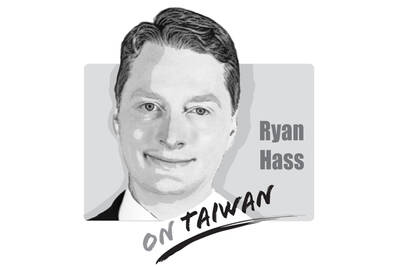As if it didn't already have its hands full fighting the outbreak of severe acute respiratory syndrome (SARS), Taiwan also has to deal with the appalling way it is treated by the World Health Organization (WHO). The WHO's disregard for the health and welfare of the people of this country for political reasons is no better than China's deliberate concealment of the epidemic. At least the Chinese government has finally managed to muster a long-overdue and now meaningless apology for its shameful conduct. When will the WHO correct its own mistake?
The WHO has consistently referred to this country as "Taiwan, China" or "Taiwan Province" of China, totally disregarding the nation's sovereignty. Perhaps in the eyes of the international community the statehood of Taiwan continues to be a question open to debate. But, as a supposedly non-political international organization, it is entirely out of place for the WHO to take sides in this debate. The least it could do is to remain neutral on the issue by simply referring to this country as "Taiwan," without making any further interpretation of the country's status.
When asked by the media about the issue, WHO officials have replied that what Taiwan is called is a "political question" about which they cannot comment. But by reducing Taiwan to a mere Chinese province in its lists and news releases, the WHO is clearly "commenting" on the issue.
Worse yet, in the global battle against SARS, Taiwan is excluded from all WHO assistance. The only outside help it has received thus far is from the US Centers for Disease Control and Prevention.
WHO officials have openly conceded it is "difficult" to offer Taiwan any assistance since it is not a WHO member. But doesn't this demonstrate the need to allow Taiwan to join the organization, or at the very least let it be an observer? If Taiwan was truly a Chinese province, then it should be able to receive WHO assistance via China, which is already a WHO member. In reality, that is entirely impossible, because China and Taiwan are ruled by different governments.
The message is loud and clear: Unless Taiwan reduces itself to become a Chinese province, no WHO help will be forthcoming, however badly needed this assistance may be. China naturally did not miss the chance to highlight this point by offering to help Taiwan combat the SARS epidemic. In view of China's disastrous handling of the epidemic so far, only a fool would accept that kind of offer.
Much to the comfort of Taiwanese, some true friends have expressed their support. In the past few days, both the Canada-Taiwan Parliamentary Friendship Group and the US Congress' Taiwan Caucus have criticized the WHO and called for Taiwan to be allowed to be a WHO observer. Furthermore, on Thursday, the Canadian Parliament passed a resolution supporting Taiwan's WHO bid. The US House of Representatives has also passed legislation requiring the US secretary of state to help Taiwan join the organization.
On the other hand, there is Thailand, which treats travelers from Taiwan the same as those from China by requiring them to undergo physical checkups upon arrival and wear surgical masks for the first 14 days of their visits. This is obviously because Thailand thinks that Taiwan is part of China. It is very likely that Thailand was influenced by the WHO's attitude.
The WHO should live up to its name and truly serve as the health organization for the whole world, including Taiwan.

There has been much catastrophizing in Taiwan recently about America becoming more unreliable as a bulwark against Chinese pressure. Some of this has been sparked by debates in Washington about whether the United States should defend Taiwan in event of conflict. There also were understandable anxieties about whether President Trump would sacrifice Taiwan’s interests for a trade deal when he sat down with President Xi (習近平) in late October. On top of that, Taiwan’s opposition political leaders have sought to score political points by attacking the Lai (賴清德) administration for mishandling relations with the United States. Part of this budding anxiety
The diplomatic dispute between China and Japan over Japanese Prime Minister Sanae Takaichi’s comments in the Japanese Diet continues to escalate. In a letter to UN Secretary-General Antonio Guterres, China’s UN Ambassador Fu Cong (傅聰) wrote that, “if Japan dares to attempt an armed intervention in the cross-Strait situation, it would be an act of aggression.” There was no indication that Fu was aware of the irony implicit in the complaint. Until this point, Beijing had limited its remonstrations to diplomatic summonses and weaponization of economic levers, such as banning Japanese seafood imports, discouraging Chinese from traveling to Japan or issuing
On Nov. 8, newly elected Chinese Nationalist Party (KMT) Chairwoman Cheng Li-wun (鄭麗文) and Vice Chairman Chi Lin-len (季麟連) attended a memorial for White Terror era victims, during which convicted Chinese Communist Party (CCP) spies such as Wu Shi (吳石) were also honored. Cheng’s participation in the ceremony, which she said was part of her efforts to promote cross-strait reconciliation, has trapped herself and her party into the KMT’s dark past, and risks putting the party back on its old disastrous road. Wu, a lieutenant general who was the Ministry of National Defense’s deputy chief of the general staff, was recruited
The Food and Drug Administration (FDA) on Nov. 5 recalled more than 150,000 eggs found to contain three times the legal limit of the pesticide metabolite fipronil-sulfone. Nearly half of the 1,169 affected egg cartons, which had been distributed across 10 districts, had already been sold. Using the new traceability system, officials quickly urged the public to avoid consuming eggs with the traceability code “I47045,” while the remainder were successfully recalled. Changhua County’s Wenya Farm — the source of the tainted eggs — was fined NT$120,000, and the Ministry of Agriculture instructed the county’s Animal Disease Control Center to require that